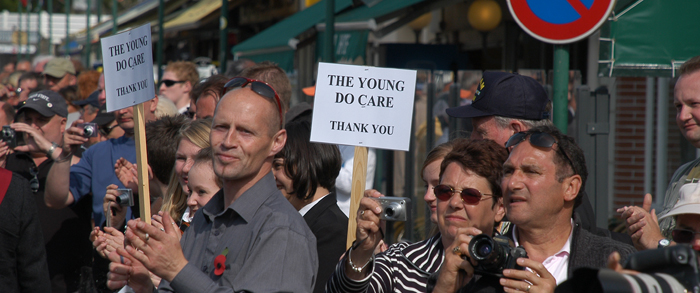
He flew with a Handley Page Halifax (type II, serial JB839, code KN-K).
5 September 1943 (Eighth Air Force):: VIII Air Support Command Mission 48: 3 marshalling yards are targeted. 72 B-26's are dispatched to 2 marshalling yards at Ghent, Belgium; 31 bomb one yard at 0827 hours; 32 bomb the second yard at 0831 hours; the 36 B-26's dispatched to the marshalling yard at Courtrai, France are recalled due to weather; 38 B-26's are damaged; casualties are 4 WIA.
6 September 1943 (Eighth Air Force):: VIII Bomber Command Mission 91: Aircraft and bearing factories in and around Stuttgart, Germany are targeted but extensive clouds prevent all but a few B-17's from attacking the primary targets. Formations become separated and disorganized and attack targets of opportunity in a wide area. 1.
151 of 181 B-17's of the 1st Bombardment Division attack various targets of opportunity at 0951-1017 hours; they claim 32-6-21 Luftwaffe aircraft; 27 B-17's are lost, 9 are damaged beyond repair and 47 damaged; casualties are 14 WIA and 153 MIA. 2. 111 of 157 B-17's of the 3d Bombardment Division hit Stuttgart and various targets of opportunity at 0940-1229 hours; they claim 66-14-29 Luftwaffe aircraft; 18 B-17's are lost, 1 is damaged beyond repair and 69 damaged; casualties are 2 KIA, 13 WIA and 180 MIA. 3. 60 of 69 B-24's of the 2d Bombardment Division fly a diversion. 176 P-47's fly escort for the B-17's; they claim 1-0-0 Luftwaffe aircraft; 1 P-47 is lost. Strong fighter opposition is encountered and 45 B-17's are lost.
VIII Air Support Command Missions 50 and 51. 1. 144 B-26's are dispatched to the marshalling yards at Ghent, Belgium and Rouen, France; the Ghent mission is recalled when bad weather prevents the fighter escort from taking off; 66 hit Rouen at 0738 and 0739 hours; 3 B-26's are damaged; casualties are 1 WIA. 2. 144 B-26's are dispatched to the marshalling yards at Amiens and Serqueux, France; 126 hit the targets at 1755 to 1757 hours; 3 B-26's are damaged.
605 aircraft - 299 Lancasters, 195 Halifaxes, 111 Stirlings - ordered to carry out a second 'double' attack, this time against Mannheim and Ludwigshafen. 34 aircraft - 13 Halifaxes, 13 Lancasters, 8 Stirlings - lost, 5.6 per cent of the force. The target area for this double attack was clear of cloud and the Pathfinder marking plan worked perfectly. Ground-markers were placed on the eastern side of Mannheim so that the bombing of the Main Force - approaching from the west - could move back across Mannheim and then into Ludwigshafen on the western bank of the Rhine. The creepback did not become excessive and severe destruction was caused in both targets.
4 Mosquitos to Düsseldorf, 25 aircraft minelaying in the German Bight, near Texel and off Brest and Lorient. No aircraft lost.
Munich: 257 Lancasters and 147 Halifaxes.
The Pathfinders found that Munich was mostly covered by cloud and neither their ground-markers nor their skymarkers were very effective. Most of the Main Force crews could do no more than bomb on a timed run from the Ammersee, a lake situated 21 miles south-west of the target. The bombing was mostly scattered over the southern and western parts of the city. 16 aircraft - 13 Halifaxes, 3 Lancasters - lost, 4.0 per cent of the force.
This record can also be found on the maps of WW2 History Europe with Google coordinates. You can find the maps by clicking on this link on this location.
There are several possibilities to investigate the flight records on WW2 History Europe. All the flights are plotted on maps, sorted "day by day", "by squadron", "by type aircraft", "by year or month", "by location" and much more! Don't miss this!!!
If you have any information that you want to share, please add your comment at the bottom of this record. Or send your information to info@ww2history.eu. This information will be added to the record.
Your photos and your information are very welcome! The young do care and with your help we keep up the good work.
